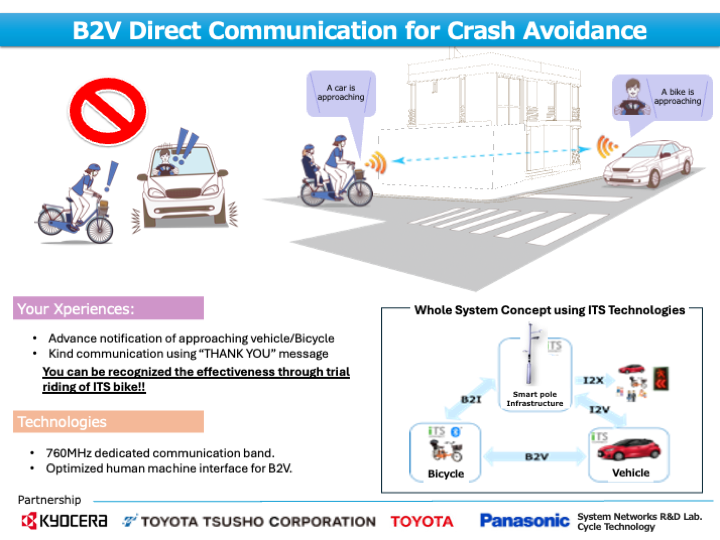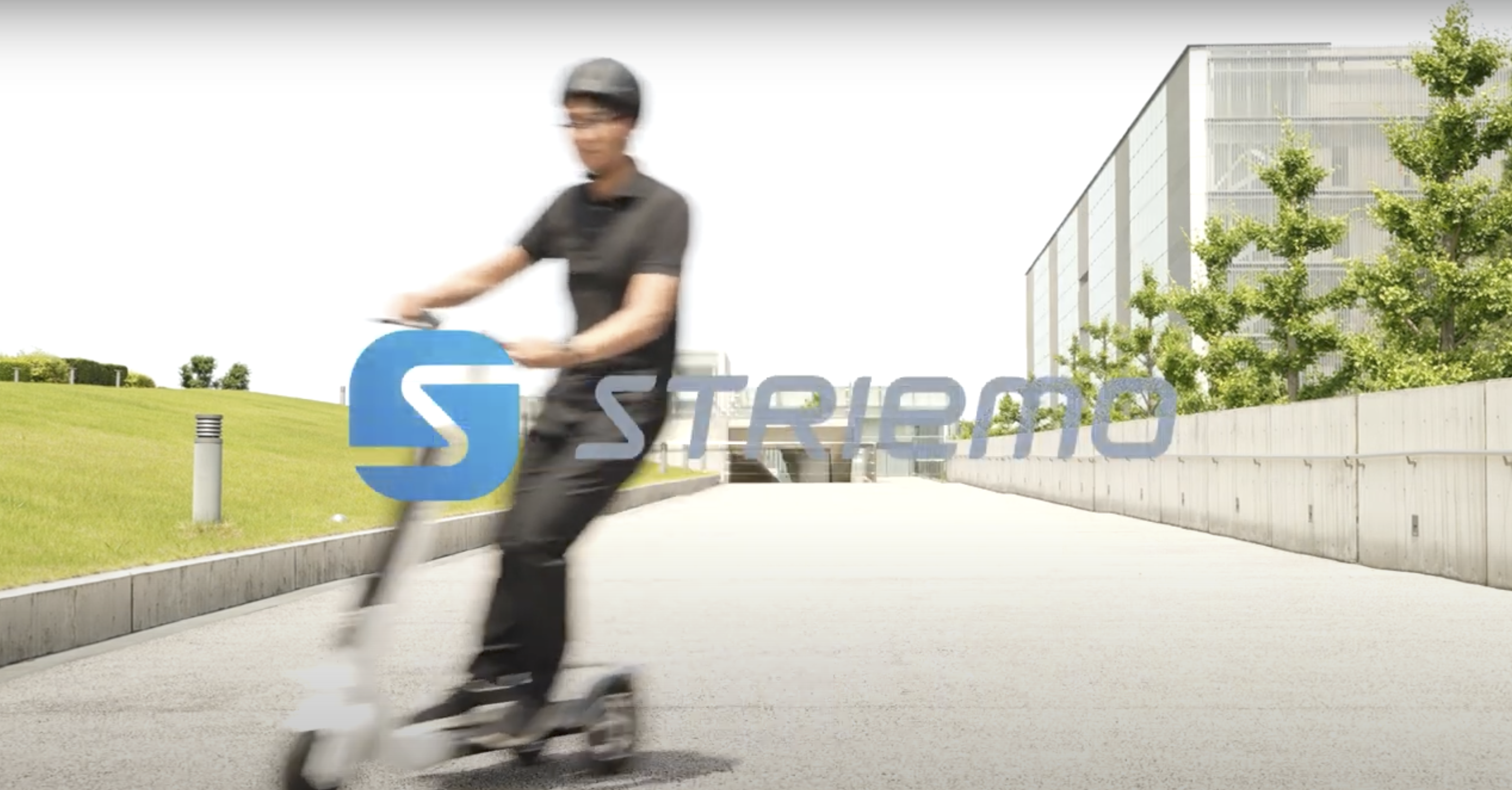| Demonstration on 5 November 2024. |

#Test ride of e-scooter

https://www.youtube.com/watch?v=WJQEJB9qvnY
| Technical Bicycle Tours |



| Workshops on 5 November 2024. |
Workshop 1: Bicycle Safety Education for Children from the Perspective of Developmental Stage(TBD)
Time: 9:30-11:30
Education and training is essential to nurture safe bicycle riding culture. However, in many countries, including Japan, children as well as adults hardly receive sufficient education. Further, during the previous several decades, infrastructure in Japan had been designed on the premise that bicyclists ride on the sidewalk. As a result, bicyclists have been tolerated for a long time to behave like pedestrians when it suites them. As Japanese government tries to change the current practice, it is the right time to review and propose systematic education for safe bicycle riding aimed at children, caregivers, or other individuals of different life stages.
What is the aim of the workshop? : The aim of the workshop is to share scientific knowledge of traffic safety education aimed at children of different developmental stages and to discuss practical challenges in light of current Japanese situation. Education and training for adults can be included.
Who can participate?: Experts who are interested in traffic safety education and aware of the related challenges. The workshop will allow a maximum of 30 individuals.
What are the session methods?: After providing the latest research findings and a framework for traffic safety education, the participants will exchange opinions on how to proceed with future research and practice.
How can I participate?: Participants are required to prepare a free-format abstract of up to 500 words that presents result of recent research or critical review relating to bicycle safety education for children of different developmental or life stages. Please submit your abstracts by 7 October 2024.
What are the expected outcomes?: The concept of bicycle safety education should be shared through ongoing workshops in the following years.
For more information about the workshop, including participation and abstract submission, please contact Mio Suzuki (mio.suzuki@tokai.ac.jp) or Kazuko Okamura (okamura@nrips.go.jp).
Workshop 2: Interactions between Connected and Autonomous Vehicles and Two-Wheelers(TBD)
Time: 12:30-15:30
One of the challenges that has been identified in recent conferences and publications is the need to ensure that Connected and Autonomous Vehicles (CAVs) will improve safety for bicycle and e-scooter riders, rather than create further challenges.
What is the aim of the workshop? : A workshop will be held as part of the International Cycling Safety Conference 2024 to present new research in this area and discuss future directions.
Who can participate?: The workshop will be hosted by the International Research Centre to Study the Effects of Connected and Autonomous Vehicles on Vulnerable Road-Users (ICAROS), which is a collaboration of researchers from Loughborough University (UK), Tongji University (China) and Queensland University of Technology (Australia). You can participate by submitting an abstract to present your related research on this topic or by simply registering to attend the workshop and contributing to the discussion.
What are the session methods?: The workshop will have 3 components: a brief presentation of the ICAROS findings, presentations by other researchers on related topics, and facilitated discussions among participants regarding future directions in this area. The workshop will allow a maximum of 50 participants.
How can I participate?: Participants are required to prepare an unstructured abstract of up to 500 words that presents the results of recent research relevant to interactions between CAVs and two-wheelers, or discusses methodological or ethical challenges in research or implementation. Please submit your abstracts by 7 October 2024.
What are the expected outcomes?: This workshop aims to provide participants with an overview of research findings and challenges in the area of CAV-two-wheeler interactions that will help them to identify gaps in our knowledge future research directions.
For more information about the workshop, including participation, abstract submission, or general inquiries, please contact Andrew Morris (A.P.Morris@lboro.ac.uk) or Narelle Haworth (n.haworth@qut.edu.au).
Workshop 3: Moving from the present to the future: upcoming issues, methods and challenges in cycling safety research(TBD)
Time: 15:45-17:45
Join us for a pioneering and collaborative workshop as we explore the next frontiers in cycling research, part of the International Cycling Safety Conference 2024.
What is the aim of the workshop? : The objective of this workshop is to gather a global community of researchers, practitioners, and policymakers to discuss and predict the future of cycling safety research. Our focus will be on identifying and addressing strategic issues that will shape cycling safety over the next two decades, including technological advancements, urban planning integration, evolving policy landscapes, and environmental sustainability.
Who can participate?: We are calling upon an interdisciplinary mix of professionals, such as academic researchers, data scientists, transportation engineers, urban planners, public health experts, environmentalists, practitioners, and policymakers. Their diverse expertise will ensure a comprehensive exploration of cycling safety from multiple angles. The workshop will allow a maximum of 30 individuals.
What are the session methods?: Interactive methodologies, including scenario planning, expert panels, and collaborative brainstorming sessions, will be used to draw out the collective knowledge of the participants. This approach will enable the development of innovative solutions and robust research pathways focused on the future of cycling safety.
How can I participate?: Participants are required to prepare a free-format abstract of up to 500 words, presenting research ideas or critical reviews that focus on future developments in cycling safety research. These abstracts should specifically address the question “What research would you be doing in 20 years?” This futuristic perspective will form the basis for group discussions and aid in crafting a forward-looking research agenda and subsequent publication. Please submit your abstracts by Oct 10th, 2024.
What are the expected outcomes?: This workshop aims to forge an international collaboration network and produce a strategic publication that will guide future research efforts on cycling safety globally. This foundational publication will provide direction for creating safer cycling environments and influencing policy development worldwide.
For more information about the workshop, For more information about the workshop, including participation, abstract submission, or general inquiries, please contact Sergio A. Useche (sergio.useche@uv.es), Oscar Oviedo Trespalacios (o.oviedotrespalacios@tudelft.nl). We look forward to your innovative contributions and are excited to collaborate on shaping the future of cycling safety research!
